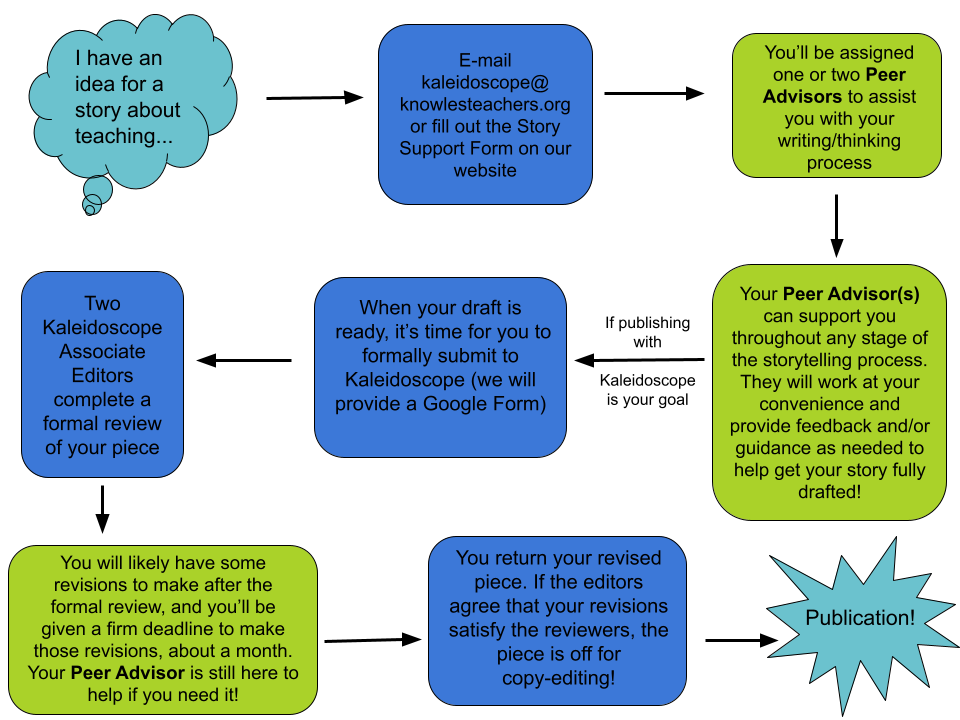Peer Advising: A Lever to Promote Teacher Storytelling

Peer Advising With Kaleidoscope: What Is It?
The goal of Kaleidoscope’s Peer Advising Program is to support teacher-storytellers so they feel comfortable sharing their stories and continue (and encourage others) to share more teacher-stories. Peer advisors offer free writing support to anyone looking to publish with Kaleidoscope, including authors outside of the Knowles community. Peer advisors support authors at any stage of the writing process, from brainstorming, to organization and elaboration, to clarity and editing. They also support the Knowles community in their other writing goals, such as developing a writing habit, writing a piece for personal reflection, or submitting to another publication. Peer advisors take a shoulder-to-shoulder stance with authors, working alongside them rather than acting as an authority on writing, helping to build both their ideas and writer-identity. Peer advisors facilitate conversations, provide writing exercises, help generate goals, set deadlines, and walk with authors through the process of writing and publishing (Figure 1). When Kaleidoscope was first founded, peer advisors worked as volunteers, but as the journal grew, so did the Peer Advising Program. Now, peer advisors undergo more extensive training, have more support, and receive a stipend. The peer advising support has led to the elevation of more teacher voices, particularly from educators who haven’t fully developed their writer-identity. By offering this background into the Peer Advising Program, we hope you will decide to seek out a peer advisor, act as one for someone else, or even replicate support in your context.
Figure 1
Kaleidoscope Standard Operating Procedure, with peer advising shown in green.

What It’s Like To Have a Peer Advisor
Three authors explain why they wanted a peer advisor, describe the experience, and reflect how it affected their identity as a writer, teacher, and leader.
Beverly
At first, it was more like a peer advisor pursued me! As part of the Knowles Fellowship, I was reflecting on many ideas and my peer advisor pushed me to publish both a professional development review and a personal reflection about teaching with one-to-one computing. I have always enjoyed writing but felt my stories wouldn’t be relevant to anyone else. My peer advisor acted as a sounding board to help me process, supported my ideas, and convinced me that others would benefit from reading about them. This support helped shift my writer-identity from someone who solely writes for processing to someone who has important and evocative stories to share. Afterward, I was compelled to replicate this support for others, whether for my students or as a peer advisor for another teacher-author.
Sarah
Having a peer advisor provided essential accountability, particularly for a recent piece that I co-authored with three other Knowles Fellows. The primary goal was to publish our framework for Project Based Learning (PBL) that we had developed together over several years. Our advisor’s support was critical to achieving that goal. She helped us refine our ideas and focus on a stronger piece, which would have been longer and less cohesive without her help. Our advisor helped us manage deadlines, stay organized, and ultimately, meet our goal of publishing. My initial concerns about additional meetings during an already hectic time proved unfounded. Her efficiency and focus saved time and even helped our group generate ideas for future articles. The times I’ve had a peer advisor positively changed my view on writing, helping me see it as an approachable task. Receiving feedback in a supportive and non-evaluative environment was refreshing, fostering an open and comfortable space. It also reminded me of the importance of stepping out of my comfort zone, just as I encourage my students to do.
By making my knowledge public, I was providing evidence of my experience as a teacher and being a leader by allowing others to connect with my experiences.
Anthony
I had my first experience with a peer advisor when writing a teacher leadership story as a capstone for the Knowles Fellowship. The relationship supported me as I processed my thoughts and determined which parts of the story I was ready to share. I knew the Knowles community was a safe place to do this work and my peer advisor was my biggest cheerleader. They listened, reiterated my story, asked questions, and helped me develop my story in my voice. Getting my ideas out was cathartic and helped to grow my teacher-writer identity. I started the peer advising process believing that my thoughts didn’t have substance, but I ended as a teacher with a strong voice. This confidence carried over into my teacher and leader identities. By making my knowledge public, I was providing evidence of my experience as a teacher and being a leader by allowing others to connect with my experiences.
What It’s Like To Be a Peer Advisor
Four current or former peer advisors reflect on how they became a peer advisor, what that experience was like, and how it affected their identity as a writer, teacher, and leader.
Kirstin
This is such a small thing, but a powerful one, too: you have to start somewhere. I am a better writer because I write more, trusting myself to edit later with help from others and my own reflections. Before being a peer advisor, I’d thought a lot about feedback, but not about what it means to stand shoulder-to-shoulder with people trying to better understand themselves in the world around them. The work of peer advising fast-tracked my capacity to build a coaching-forward classroom. Equally important, peer advising helped me reflect on the ways that I want to show up as a teacher and a colleague. While critique is a powerful tool for improvement, celebrating students’ and teachers’ existing wisdom and passion is critical as well! Peer advising holds a mirror up to teachers at a very vulnerable moment, and I love reflecting back what I enjoy, find fascinating, and am learning from others’ work.
Beverly
In addition to supporting me with the publication process, having a peer advisor allowed me to unpack ideas and assumptions in a way I hadn’t before. I wanted others to have this experience too, so when Kaleidoscope put out a call for peer advisors, I signed up. Later, I designed a more extensive training for the Peer Advising Program, which included writing a grant for funding to pay peer advisors. Since then, I’ve worked with dozens of authors and also had peer advisors work with me on more of my own writing. Standing shoulder-to-shoulder with teachers as they develop their stories and elevate their voices continues to inspire me and my writing. It has also given me new perspectives on both my students and colleagues, sparking a desire to know their stories and to be a more reflective practitioner and open listener.
As a school leader, peer advising has improved my coaching skills, influencing how I provide feedback and support across various contexts.
Sarah
I initially became a peer advisor to improve my writing skills, which I considered a weakness. At first, I felt intimidated by the talented advisors I worked with and questioned what I could contribute, but learning from veteran advisors helped me appreciate their thoughtful approach and develop my own confidence. Now, I find joy in assisting others and contributing to their storytelling journeys. This role has significantly enhanced my writer-identity; constructive interactions with advisees bolster my confidence as a feedback partner and foster growth for both of us. As a school leader, peer advising has improved my coaching skills, influencing how I provide feedback and support across various contexts. I’ve even incorporated storytelling into the professional learning I facilitate at my school. Each advising relationship is an opportunity for mutual learning; I approach each interaction with curiosity, eager to understand the advisee’s narrative and support needs. A successful advising relationship, to me, culminates in the advisee achieving their writing goals, whether through publication, reflection, or personal fulfillment.
Anthony
I knew power in listening to teachers’ stories and cheering them on, so I wanted to be a peer advisor. Peer advising allowed me practice developing community with other teachers, which in turn helped me navigate my school spaces where people have differing values. Peer advising let me look into other teachers’ worlds and uplift and validate their stories. While every peer advising experience is unique, I focus on listening to authors, reflecting back their ideas, and asking probing questions to understand. The confidence to publish comes from a good working relationship where the author’s voice is preserved and elevated. This curious and open stance helped me become a better coworker, inspiring me to take down walls, seek more connections , and find ways to hear their story.
What Success Looks Like in Peer Advising
The peer advising process largely depends on the author’s goals and other life commitments. The author’s ambitions inform what “success” looks like for each peer advising pair.
Getting Started
Some seek out a peer advisor when they’ve already written a full draft for publication and want feedback from a fresh set of eyes. Others reach out when they are generating ideas and looking for a sounding board—someone to help them flesh out their ideas and decide what might resonate with a larger audience. Still others want a thinking partner to help them process an experience through writing, without an explicit goal to publish. Whatever your path, your matched peer advisor(s) will begin by meeting with you online or by phone to start identifying your goals and best ways to support you.
Digging In
Peer advisors individualize the relationship to meet your needs. Collaboration might take place synchronously, over phone or video calls; it may be asynchronous, via email or in document comments; or some combination of these. The whole peer advising experience may be just a handful of interactions—setting goals and giving a few rounds of feedback while drafting a piece. On the other hand, it may be a years-long relationship! Through the process, goals may fluctuate. Peer advisors check in about goals throughout their work with an author to ensure they are best meeting the author’s needs.
Wrapping Up
Sometimes success is marked by publication of a powerful and resonant teacher story. Other times, it is measured simply by a series of conversations that helped the author to process their thoughts and experiences. In either case, we believe the largest marker of success is that an author feels validated and supported in working toward their goals.
Want to Join in the Success of Peer Advising?
Whether you have a fully formed draft already or just ideas floating around in your head, Kaleidoscope would love to hear from you! In addition to supporting teacher writing, peer advisors assist with other story formats, such as video, podcasts, comics, and more. If you’re interested in being paired with a peer advisor, please fill out our Story Support Form and you will receive a response within a few days. Kaleidoscope’s peer advisors would love to help get your story into the world!
Citation
DiMaria, S., Milks, K., Stetzenmeyer, A., Stuckwisch, B. (2025). Peer advising: A lever to promote teacher story-telling. Kaleidoscope: Educator Voices and Perspectives, 11(2), https://knowlesteachers.org/resource/peer-advising-a-lever-to-promote-teacher-storytelling.
